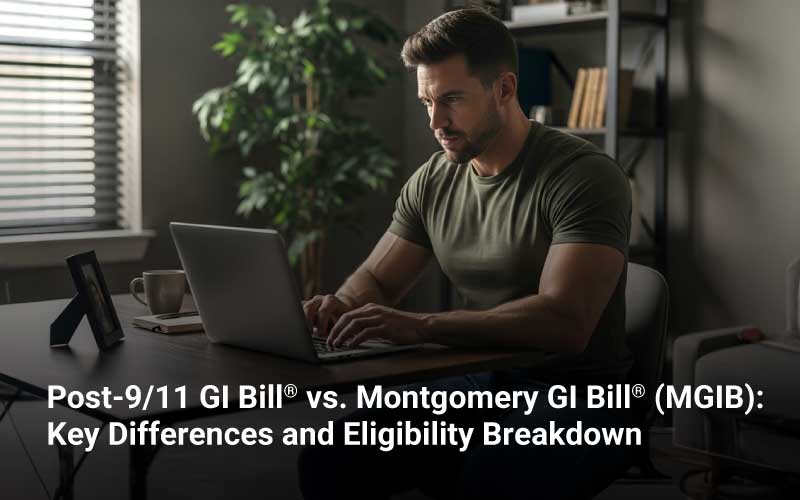Veterans and current service members are offered education benefits under several GI Bill® programs. Among the various programs, two of the most compared and applied for GI Bill® Veteran’s Education Benefits Program are the Montgomery GI Bill® (MGIB) and the Post‑9/11 GI Bill® (Chapter 33). The Montgomery GI Bill predates Post‑9/11, and it was the main GI Bill® educational benefit for many years. The Post‑9/11 GI Bill®, launched in 2008 (effective August 1, 2009), was designed to expand and modernize the benefits for those who served after September 10, 2001.
While both programs provide up to 36 months of benefits, the differences in eligibility, the amount paid, and how benefits are delivered are significant. The program you choose depends on your eligibility, service record, your educational goals, whether you need housing support, and whether you plan to transfer benefits to dependents.
GI Bill® Education Benefits: Post-9/11 vs. Pre-9/11 (Montgomery) Programs
Montgomery GI Bill® (MGIB)
The Montgomery GI Bill®, also known as the Pre-9/11 GI Bill®, is a U.S. Department of Veterans Affairs education benefit program that provides a monthly stipend to eligible Active-duty Service Members (MGIB-AD) and Selected Reserve (MGIB-SR) to cover education and training costs.
Montgomery GI Bill® Active-Duty (MGIB-AD):
- You entered active duty for the first time after June 30, 1985, and
- You had $100 per month deducted from your pay for the first 12 months (total = $1,200), and
- You served:
- At least 2 continuous years on active duty (if you enlisted for 2 years), or
- 3 or more years (if your enlistment was longer), and
- You received an honorable discharge, and
- You completed high school or an equivalent before or during your service.
Montgomery GI Bill® Selected Reserve (MGIB-SR):
- You have a 6-year service obligation in the Selected Reserve, and
- You are actively drilling (not on Individual Ready Reserve status), and
- You complete Initial Active Duty for Training (IADT), and
- You have a high school diploma or equivalent, and
- You are in good standing with your unit.
Post‑9/11 GI Bill® (Chapter 33)
The Post‑9/11 GI Bill® (Chapter 33) is another education benefit program for veterans who served active duty after September 10, 2001. It covers up to 100% of tuition fees, provides a monthly housing allowance, and includes a stipend for books and supplies, making it ideal for those attending college, vocational training, or other approved programs.
You must have served:
- At least 90 aggregate days of active duty after September 10, 2001, OR
- Served at least 30 continuous days and were discharged due to a service-connected disability
- You must have been honorably discharged or received a qualifying separation (e.g., medical or hardship separation)
What Are the Key Eligibility Differences
| Criterion | Montgomery GI Bill® (MGIB) | The Post-9/11 GI Bill® |
|---|---|---|
| Service requirement | Typically, at least 2–3 years of active duty, depending on contract; or for Selected Reserve, certain service obligations. | At least 90 days aggregate active-duty service after Sept 10, 2001, for full benefits, 36 months or more. Also, special provisions for 30 days and discharge for disability. |
| Honorable discharge or status | Required. | Required. |
| Time to use benefits after separation | Usually 10 years. | Originally 15 years, but under the Forever GI Bill® legislation, for many, the 15-year limit has been removed for service on or after Jan 1, 2013. |
What the Benefits Look Like
Here are the benefits covered under the two programs, and how they differ:
| Benefit Type | Montgomery GI Bill® (MGIB) | The Post-9/11 GI Bill® |
|---|---|---|
| Tuition & Fees | MGIB gives a fixed monthly stipend directly to the veteran. The veteran is responsible for paying the school. The stipend is based on service, what kind of program, etc. | Tuition and fees are paid directly to the school. If the veteran is attending a public in-state school, a full tuition fee may be covered. For private or non-public schools, there is a cap on the tuition fee. |
| Housing / Living Expenses | MGIB does not provide a separate housing allowance. Veterans may have to use their monthly stipend if living expenses need to be covered. | Post-9/11 GI Bill® provides a Monthly Housing Allowance (MHA), based on the Basic Allowance for Housing (BAH) of an E-5 with dependents in the location of the school (if attending in-person, more than half-time). For online or distance classes, there is usually a reduced or no housing benefit. |
| Books & Supplies | MGIB does not provide a separate books and supplies fee; veterans must cover these from their monthly stipend. | Post-9/11 GI Bill® offers up to $1,000/year for books, supplies, etc. |
| Transfer to Dependent | MGIB benefits are not transferable to dependents. | Under the Post-9/11 GI Bill®, transfer of unused benefits to spouse or children is possible under certain criteria (e.g., must be serving long enough, must elect transfer while still active duty, and meet other requirements). |
| Duration or Usage Window for Benefits | Up to 36 months of benefits. For MGIB, benefits generally must be used within 10 years after discharge or separation (for those eligible) under the traditional rules. | Up to 36 months of benefits. For many, under the Post-9/11 GI Bill®, one has 15 years after separation; recent legislation, Forever GI Bill®, has removed the time limit for certain categories (for example, service members who served after Jan 1, 2013). |
| Eligibility for Training Types | MGIB may cover a wide variety: degree programs, non-degree (vocational, technical), apprenticeships, correspondence courses, licensing/certification, etc. | Post-9/11 GI Bill® is applicable for approved degree-granting institutions, but for some non-degree or non-traditional programs (trade, certification, etc.), eligibility depends on whether the institution is approved, or whether the veteran transferred in from MGIB or another similar program. In some cases, non-degree programs might have fewer benefits or different rules. |
How do the GI Bill® Benefits Work, Based on Different Scenarios
| Scenario | Likely Better Choice |
|---|---|
| Full-time degree at a public in-state college | Post-9/11 GI Bill® may likely work for you because you typically get full coverage of tuition, housing, and books. |
| Private or out-of-state college with high tuition | Post-9/11 GI Bill® may still be better, especially if Yellow Ribbon covers the excess, but compare carefully, if tuition is enormously above cap. |
| Less than half-time or online study | Might favor MGIB or compare carefully. Post-9/11 GI Bill® housing and stipend benefits are often reduced or eliminated. |
| Want to transfer benefits to spouse/children | Post-9/11 GI Bill®, since MGIB doesn’t offer this. |
| Want maximum flexibility and maximum benefit (especially living costs) | Post-9/11 GI Bill®, almost always wins here. |
Scenario Where Individuals Qualify for Both Post‑9/11 GI Bill® and Montgomery GI Bill®
A person can be eligible for both the Post-9/11 GI Bill® and the Montgomery GI Bill® (MGIB). Service members become eligible for both if they:
- Qualify as an MGIB-Active-duty member and have paid into the Montgomery GI Bill® (typically $1,200 deducted during basic training), and
- Served on active duty after 9/11 long enough to qualify for the Post-9/11 GI Bill® (at least 90 days of aggregate service).
OR
- Qualify as an MGIB-Selected Reserve member and have served qualifying active duty.
- Served on active duty after 9/11 long enough to qualify for the Post-9/11 GI Bill® (at least 90 days of aggregate service).
- Weekend drills and annual training do not count as qualifying active duty for Post-9/11 GI Bill®.
If eligible for both Post‑9/11 GI Bill® and Montgomery GI Bill®, it is essential to compare your cost of tuition fees, living expenses, and books at your intended institution to pick the best for you. It is also recommended that you review the rules for eligibility, service time, election, and deadlines. Some rules change based on the date of entry, active-duty status, etc.
Important Note: If You Qualify for both Montgomery GI Bill® and Post-9/11 GI Bill®
- You cannot use both programs at the same time for the same period of school or training.
- You must elect which program to use when applying for education benefits (VA Form 22-1990).
- The total combined entitlement from any VA education programs (like MGIB-AD, MGIB-SR, and Post-9/11) is capped at 48 months.
- You can switch from MGIB-AD to the Post-9/11 GI Bill® if you are eligible.
- Once you switch, it is irrevocable; you cannot go back to MGIB afterward.
Conclusion
Both the Post-9/11 GI Bill® and the Montgomery GI Bill® offer valuable educational benefits to different service members and veterans coming from different service backgrounds. Understanding the difference between the different education benefit programs and evaluating your individual eligibility, educational goals, and financial needs is key to selecting the program that best supports your path to success.
Suppose you are a veteran or service member eligible for both. In that case, it would be wise to run the numbers using your likely institution’s tuition, housing, expenses, and the type of program you will enroll in, part‑time or full-time, and see which gives you more for your educational costs.
Speak to a VA Enrollment Advisor from the institute where you plan to pursue your education. For example, EC-Council University is approved to accept VA education benefits for the ECCU program. A dedicated team of Veterans’ Enrollment Advisors will guide you through your enrollment process and navigate through the different VA education benefits programs.
FAQs
You can’t use both concurrently. You generally choose which GI Bill® you want to use. But suppose you have separate qualifying periods of service. In that case, one qualifying for MGIB and for Post‑9/11 GI Bill®, under the Rudisill decision, you may be eligible for up to 48 months total by combining entitlements.
No, once you select to use Post‑9/11 GI Bill®, you usually give up the ability to use MGIB (for that same entitlement period).
You may be eligible for additional benefit months (up to 48 in total). Also, some MGIB entitlements you relinquished when choosing Post‑9/11 GI Bill® may be reinstated.
For Post‑9/11 GI Bill®, if your last separation from active duty was before January 1, 2013, your benefits expire 15 years after that separation. If on or after January 1, 2013, there is no expiration under the Forever GI Bill® law.
For Montgomery, there are earlier time limits (often 10 years) in many cases. (Check your specific contract and discharge date.)
It depends on the length of active-duty service after September 10, 2001. For example, 36 months or certain conditions yield 100%; less time yields lesser percentages (e.g. 90%, 80%, etc.). The VA publishes the qualifying time thresholds.







